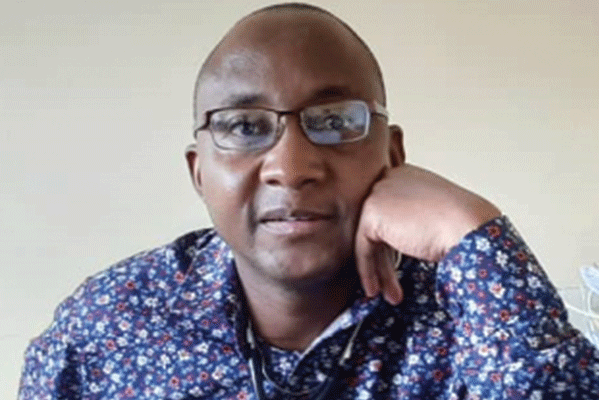
health talk:with Dr Johannes Marisa
A lot of people have forgotten about other serious medical conditions, which have been wreaking havoc for all the years because focus has been given to the Covid-19 pandemic. It was only on Wednesday last week when the country woke up to the news of Patson Dzamara’s untimely death due to colon cancer (May his soul rest in peace). In 2018, colorectal cancer saw about 1,8 million people being diagnosed of it with close to 800 000 casualties in the world. We have to remain alert about this cancer!

Colon cancer is a type of cancer that begins in the large intestine. The colon is the final part of the digestive tract. This cancer typically affects older adults though it can happen at any age. It usually begins as small, non-cancerous clumps of cells called polyps that form on the inside of the colon. Over time, some of these polyps can become colon cancers.
Symptoms and signs Many people that have been diagnosed of colon cancer in my practice have presented late to clinicians with the cancer having spread to the entire body. It is wiser to go for early screening and investigations than to wait for late stage disease to appear first. Be wary of the following signs and symptoms:
lA persistent change in your bowel habits, including diarrhoea or constipation or a change in the consistency of your stool.
lRectal bleeding or blood in the stool.
lPersistent abdominal discomfort such as cramps, gas or pain.
- Chamisa under fire over US$120K donation
- Mavhunga puts DeMbare into Chibuku quarterfinals
- Pension funds bet on Cabora Bassa oilfields
- Councils defy govt fire tender directive
Keep Reading
lA feeling that your bowel does not empty completely.
lWeakness or fatigue.
lUnexplained weight loss.
Risk factors There are risk factors for colon cancers and these include:
Older age: The majority of colon cancer patients are older than 50 years although any age can have it.
Inflammatory intestinal conditions: Chronic inflammatory diseases of the colon such as ulcerative colitis and Crohn’s disease can increase risk.
Family history of colon cancer: You are more likely to develop colon cancer if you have a blood relative that had the disease.
Low-fibre, high-fat diet: Colorectal cancer may be associated with a typical Western diet, which is low in fibre and high in fat and calories.
Smoking: Smoking has generally been associated with a lot of cancers and it is the same in colon cancers.
Alcohol: Heavy use of alcohol increases your risk of colon cancer.
Radiation therapy for cancer: Radiation therapy directed at the abdomen to treat previous cancers increases the risk of colon cancer.
A sedentary lifestyle: Research has shown that inactivity can contribute to bowel cancer. It is therefore prudent to get regular physical activity and this can reduce the risk of bowel cancer.
Lifestyle changes to reduce your risk of colon cancer lEat a variety of fruits, vegetables and whole grains: Fruits, vegetables and whole grains contain vitamins, minerals, fibre and anti-oxidants which may play a role in cancer prevention. Choose a variety of these fruits and vegetables.
lStop smoking: Smoking exposes you to carcinogens.
lExercise most days of the week: Try to get at least 30 minutes of exercise on most days lMaintain a healthy weight: Work to maintain your weight by combining a healthy diet with daily exercise. Aim to lose weight slowly by increasing the amount of exercise you get and reducing the number of calories you eat.
Diagnosis If your signs and symptoms point to colon cancer, your clinician can recommend one or more tests and procedures. Please do not run away from procedures as is the case with many patients I have seen lately. The following can be done:
Blood tests: Blood tests which are done can give a clue of the disease but are not specific for bowel cancer. Common is Carcinoembryonic Antigen (CEA). Tracked over time, the level of CEA may help your doctor understand your prognosis or whether your cancer is responding to treatment.
Faecal occult blood tests or faecal immunochemical test: These tests are done in order to check for blood that is invisible to the naked eye. It allows for early realisation of bleeding in the bowel, which may point to problems in the bowel.
Colonoscopy: This uses a long, flexible and slender tube attached to a video camera and monitor to view the colon and rectum. If there are any suspicious areas, biopsies can be taken for histology.
Proctoscopy: This is done if rectal cancer is suspected. This allows a closer look at the inside lining of the rectum through the scope. The tumour can be seen, measured and the exact location can be determined.
Treatment
Treatment depends on the size of the cancer. Small cancers can have a minimally invasive approach to surgery and treatment can include one of the following:
lPolypectomy
lEndoscopic mucosal resection
lLaparoscopic surgery
Surgery for advanced cancers can include the following: lPartial colectomy
Other treatments include:
lChemotherapy
lRadiation therapy.
lDr Johannes Marisa is a medical practitioner, public health practitioner and educationist who can be accessed on: [email protected]











